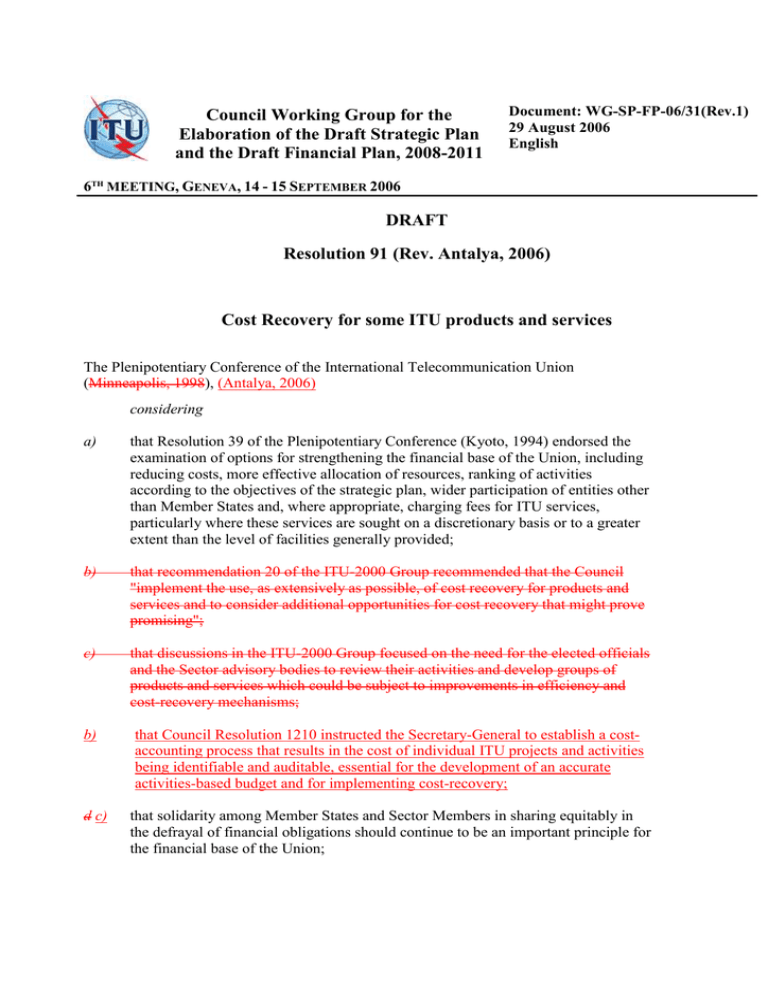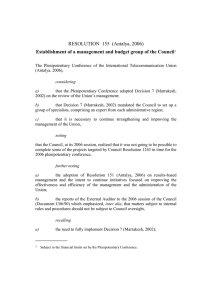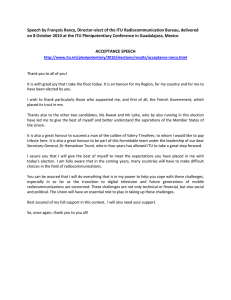Council Working Group for the Elaboration of the Draft Strategic Plan
advertisement

Council Working Group for the Elaboration of the Draft Strategic Plan and the Draft Financial Plan, 2008-2011 Document: WG-SP-FP-06/31(Rev.1) 29 August 2006 English 6TH MEETING, GENEVA, 14 - 15 SEPTEMBER 2006 DRAFT Resolution 91 (Rev. Antalya, 2006) Cost Recovery for some ITU products and services The Plenipotentiary Conference of the International Telecommunication Union (Minneapolis, 1998), (Antalya, 2006) considering a) that Resolution 39 of the Plenipotentiary Conference (Kyoto, 1994) endorsed the examination of options for strengthening the financial base of the Union, including reducing costs, more effective allocation of resources, ranking of activities according to the objectives of the strategic plan, wider participation of entities other than Member States and, where appropriate, charging fees for ITU services, particularly where these services are sought on a discretionary basis or to a greater extent than the level of facilities generally provided; b) that recommendation 20 of the ITU-2000 Group recommended that the Council "implement the use, as extensively as possible, of cost recovery for products and services and to consider additional opportunities for cost recovery that might prove promising"; c) that discussions in the ITU-2000 Group focused on the need for the elected officials and the Sector advisory bodies to review their activities and develop groups of products and services which could be subject to improvements in efficiency and cost-recovery mechanisms; b) that Council Resolution 1210 instructed the Secretary-General to establish a costaccounting process that results in the cost of individual ITU projects and activities being identifiable and auditable, essential for the development of an accurate activities-based budget and for implementing cost-recovery; d c) that solidarity among Member States and Sector Members in sharing equitably in the defrayal of financial obligations should continue to be an important principle for the financial base of the Union; -2- e) that the adoption and implementation of cost recovery for a wide range of products and services within the Union could raise some concerns about the intergovernmental nature of the Union; f) d) that the Union has developed a contributory system in which some Member States have voluntarily assumed a large share of financial support for the Union's core activities, from which all Member States benefit, although the importance of those activities may be weighted differently by different Member States, noting a) the Results-Based budgeting concept that has been developed and implemented in connection with the 2006-2007 budget of the Union, in line with Resolution 1216 of Council; b) that the 1998 Plenipotentiary Conference decided to implement operational planning in the General Secretariat and the three Sectors in order to link financial planning and the strategic plan by adopting Resolution 72 (Minneapolis, 1998) which was subsequently amended by the 2002 Plenipotentiary Conference [and this conference]; c) the adoption by Council Decision 535 of a cost allocation methodology which provides accuracy in the cost accounting process and in the allocation of costs to outputs through the design and implementation of a time tracking system, and enables the full costs of activities and outputs to be identified; e) d) the role of the Council in establishing safeguards and controls on income and expenditure when adopting biennial budgets and when reviewing annual operational plans and financial operating reports, recognizing a) that cost-recovery charges for products and services are segregated to the specific product or service, covering only the exact cost of providing the product or service to which they relate, and should not be considered as generating revenue or profit; b) that cost recovery can be a means of promoting efficiency by discouraging unnecessary or wasteful use of products and services, resolves 1 to endorse the use of cost recovery on a prepaid basis as a means of funding the products and services of the Union for which the cost-recovery approach is adopted; 2 that further application of cost recovery may be considered by the Council, and, if appropriate, implemented: i) for new ITU products and services; -3- ii) for products and services recommended by a conference or assembly of a Sector; iii) in such other cases as the Council may consider appropriate; 3 that when the Council is addressing the application of cost recovery for a particular product or service, the following factors shall be taken into account: i) when a product or service is provided for the benefit of a limited number of Member States or Sector Members; ii) when a product or service is requested to a significantly greater extent by a small number of users; iii) when products or services are requested on a discretionary basis; 4 that cost recovery should be implemented by the Council in a way which: i) ensures that no more than the actual costs of providing products and services are recovered; ii) allows for open and transparent accounting for costs and receipts; iii) provides a means of adjusting the charge for the product or service based on actual expenditure; iv) takes account of the special needs of developing countries, particularly the least developed countries, to ensure that cost recovery is not an impediment to the development of telecommunication services or networks in those countries; v) allows all Member States an adequate level of the product or service free of charge, where appropriate; vi) ensures that charges are not applied to products or services requested prior to the date of the decision by the Council or the Plenipotentiary Conference to apply cost recovery, [vii) allows for the product or service to be benchmarked, against external organizations, with a view to its efficient delivery,] instructs the Secretary-General in consultation with the Directors of the Bureaux, Member States and Sector Members, 1 to continue considering and recommending a set of criteria for the application of cost recovery, consistent with, but not limited to, resolves 2, 3 and 4 above; 2 to propose additional products and services to which the cost-recovery approach may be applied, either fully or partially; 3 to propose a clear and consistent methodology for the implementation of costrecovery charges; 43 to prepare a report for consideration at each annual session of the Council, including further actions which may be required for the implementation of cost recovery; instructs the Council -4- 1 to consider the report of the Secretary-General and adopt criteria for the application of cost recovery in a manner consistent with resolves 2, 3 and 4 above; 2 to consider, on a case by case basis, products and services which meet the criteria referred to above, and decide which products and services should be subject to cost recovery; 3 to develop appropriate charges based on full attribution of the costs of providing the service; 4 to implement appropriate arrangements to meet the needs of developing countries, particularly the least developed countries; 5 to develop accounting and control mechanisms, using appropriate accounting principles, which: i) segregate income and expenditure for the specified product or service, such that these funds cannot be mixed in with general or reserve budget funds; ii) ensure that charges are consistent with, and do not exceed, the actual cost of the product or service; iii) allow for the disclosure of any subsidies from Member State and Sector Member contributions for products or services that are subject to cost recovery; iv) promote efficiency in the delivery of products and services which are subject to cost recovery charges; 5 to ensure that any shortfall of income is properly managed, in reviewing annually the actual performance of activities subject to cost recovery so that timely corrective measures can be taken as appropriate; 6 to improve the forecasting of cost recovery income by using the Results-Based budgeting framework, time-tracking sytem and cost allocation methodology; 67 to amend the Financial Regulations as required in order to enable the implementation of cost recovery and ensure accountability and accuracy; 7 to keep the application of cost recovery under review at each Council meeting, including consideration of whether products and services subject to cost recovery continue to meet the relevant criteria and to act accordingly; 8 to report to the next subsequent Plenipotentiary Conference on action taken to implement this resolution. ____________

